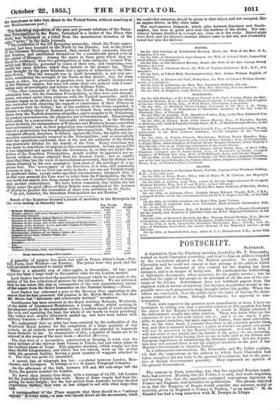POSTSCRIPT.
SATURDAY.
A deputation from the Finsbury meeting, beaded by Mr. T. Duncombe, waited on Lord Clarendon yesterday, and read to him an address founded on the resolutions adopted on the Eastern question. In reply, Lord Clarendon said he could not concur in that passage in the address which alleged that the character of this country for fair dealing has been damaged, and is in danger of being lost. He vindicated the withholding of diplomatic documents, when necessary for the public service ; but he admitted the right of the people to be informed of all the acts of the ser- vants of the Crown. Government does not withhold papers from the slightest wish in favour of mystery, but because negotiation would be im- possible were each progressive stage brought before the public. When the affairs are concluded, then the public have the right of -having the docu- ments submitted to them, through Parliament, for approval or con- demnation.
"Now, with respect to the question more immediately at issue, I have no hesitation in telling you that a peaceful solution of this question has been the object of her Majesty's Government. It would be highly criminal if the Government sought any other solution. Those who know what are the calamities of war do not rush lightly into it ; and it is our object, if pos- sible, to guard ourselves, but more especially Turkey, from those calamities. But, on the other hand, I consider that there is one calamity greater thani, war, and that is national dishonour ; a price at which I can assure you peace will not be preserved by her Majesty's Government. As I said at first, I will not enter at any length into the details of the policy wo are pursuing, but content myself with saying, that we are so fully alive to the British and European importance of maintaining the Ottoman empire, that the deputa- tion may rest assured there is not the slightest intention on the part of her Majesty's Government to abandon Turkey." In a subsequent conversation, Mr. Duncombe and Mr. Collet explain- ed, that the expressions in the address to which Lord Clarendon had taken exception did not refer to the present Government, but to the prac- tice of British Governments generally. They expressed no opinion of the present Government.


























 Previous page
Previous page